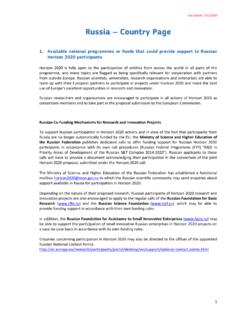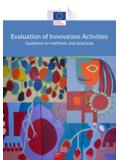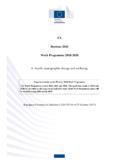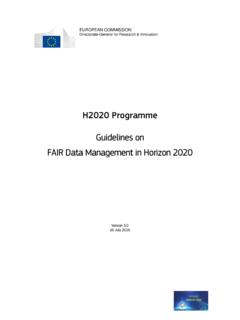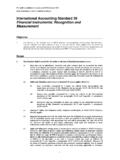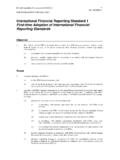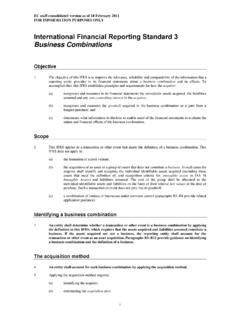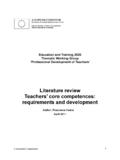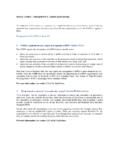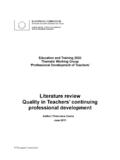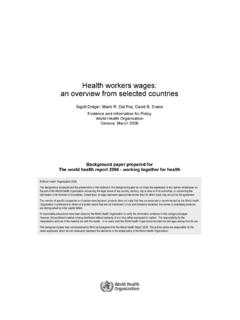Transcription of Flash Eurobarometer 379 - European Commission
1 Flash Eurobarometer 379. ATTITUDES TOWARDS BIODIVERSITY. REPORT. Fieldwork: June 2013. Publication: November 2013. This survey has been requested by the European Commission , Directorate-General for Environment and co-ordinated by the Directorate-General for Communication. This document does not represent the point of view of the European Commission . The interpretations and opinions contained in it are solely those of the authors. Flash Eurobarometer 379 - TNS Political & Social Flash Eurobarometer 379. Attitudes towards biodiversity Conducted by TNS Political & Social at the request of the European Commission , Directorate-General for Environment survey co-ordinated by the European Commission , Directorate-General for Communication (DG COMM Research and Speechwriting Unit). Flash Eurobarometer 379 Attitudes towards biodiversity . TABLE OF CONTENTS. INTRODUCTION.
2 2. MAIN FINDINGS .. 4. I. WHAT IS BIODIVERSITY ? .. 8. Familiarity with the term biodiversity .. 8. How informed EU citizens feel about biodiversity loss .. 10. II. THREATS TO BIODIVERSITY .. 14. III. THE SERIOUSNESS OF BIODIVERSITY LOSS .. 22. The seriousness of different aspects of biodiversity loss .. 22. Domestic, European and global biodiversity issues .. 29. Personal impact of biodiversity loss .. 36. IV. NATURA 2000 AND KEY ROLES OF NATURE PROTECTION AREAS .. 40. Awareness of the Natura 2000 network .. 40. Most important roles of nature protection areas .. 44. Economic development at the cost of biodiversity loss .. 53. V. RECOGNISING THE IMPORTANCE OF PROTECTING BIODIVERSITY .. 57. Why conserving biodiversity is important .. 57. The measures the EU should take to protect biodiversity .. 70. Personal efforts to help preserve biodiversity.
3 79. ANNEXES. Technical specifications Questionnaire Tables 1 Flash Eurobarometer 379 Attitudes towards biodiversity . INTRODUCTION. The European Union (EU) is committed to the protection of biodiversity , the diversity of animal species, flora and fauna, natural habitats and ecosystems. Although the EU has been legislating on biodiversity since the 1970s, biodiversity loss has accelerated both in the EU and globally in recent years. Biodiversity loss is an enormous challenge in the EU, with around one in four species currently threatened with extinction and 88% of fish stocks over-exploited or significantly depleted. In May 2011, the European Commission adopted an ambitious strategy to halt the loss of biodiversity and ecosystem services in the EU by 2020. There are six main targets, and 20 actions to help Europe reach its goal: ensuring the full implementation of EU nature legislation, better protection for ecosystems, more sustainable agriculture and forestry, better management of fish stocks, controls on invasive species, and a larger EU.
4 Contribution to averting global biodiversity The Habitats and Birds Directives are a core element of this strategy, including the European network of nature protection areas known as the Natura 2000 Network. The network currently contains over 26,000. terrestrial and marine sites, making it the largest coordinated network in the world, covering almost a fifth of the EU's land area and substantial parts of the surrounding With this in mind, this Flash Eurobarometer survey asked EU citizens to clarify how familiar they are with the term biodiversity and with the concept of biodiversity loss. The survey also dealt with the following aspects relating to biodiversity loss: The level to which EU citizens feel informed about biodiversity issues Europeans' perceptions of the major threats to biodiversity Perceptions of the seriousness of biodiversity loss at domestic, European and global levels Awareness of the Natura 2000 network and perceptions of the most important roles of nature protection areas Views on why preserving biodiversity is important, and what EU measures and personal measures can be taken to prevent the loss of biodiversity This Flash Eurobarometer survey is part of a trend survey .
5 The results of the previous survey waves were published in 2010 and 2007 Flash Eurobarometers No 290 and 219, and the current report presents comparative data between the three waves. This survey was carried out by TNS Political & Social network in the then 27 Member States of the European Union and Croatia between the 26th and 28th of June 2013. Some 25,537 respondents from different social and demographic groups were interviewed via telephone (landline and mobile phone) in their mother tongue on behalf of the European Commission , DG Environment. 1. 2. 2 Flash Eurobarometer 379 Attitudes towards biodiversity . The methodology used is that of Eurobarometer surveys as carried out by the Directorate-General for Communication ( Research and Speechwriting Unit).3 A technical note on the manner in which interviews were conducted by the Institutes within the TNS.
6 Political & Social network is appended as an annex to this report. Also included are the interview methods and confidence Note: In this report, countries are referred to by their official abbreviation. The abbreviations used in this report correspond to: ABBREVIATIONS. BE Belgium LT Lithuania BG Bulgaria LU Luxembourg CZ Czech Republic HU Hungary DK Denmark MT Malta DE Germany NL The Netherlands EE Estonia AT Austria EL Greece PL Poland ES Spain PT Portugal FR France RO Romania IE Ireland SI Slovenia IT Italy SK Slovakia CY Republic of Cyprus* FI Finland LV Latvia SE Sweden UK The United Kingdom HR Croatia EU27 European Union 27 Member States * Cyprus as a whole is one of the 27 European Union Member States. However, the acquis communautaire' has been suspended in the part of the country which is not controlled by the government of the Republic of Cyprus.
7 For practical reasons, only the interviews carried out in the part of the country controlled by the government of the Republic of Cyprus are included in the CY' category and in the EU27 average. * * * * *. We wish to thank the people throughout Europe who have given their time to take part in this survey . Without their active participation, this study would not have been possible. 3. 4. The results tables are included in the annex. It should be noted that the total of the percentages in the tables of this report may exceed 100% when the respondent has the possibility of giving several answers to the question. 3 Flash Eurobarometer 379 Attitudes towards biodiversity . MAIN FINDINGS. Familiarity with the term biodiversity has increased in 18 Member States compared with the previous survey in 2010. Across the EU, slightly less than half of Europeans have heard of the term biodiversity and know what it means (44%).
8 Three in ten have heard of it but don't know what it means (30%) and slightly more than a quarter have never heard of it (26%). Respondents are most likely to say that they have heard of the term biodiversity . and know what it means in Austria, Germany (both 80%) and Bulgaria (53%). Europeans are fairly evenly split on how informed they are about biodiversity loss. Fewer than half of them feel informed (45%) and slightly more than half feel that they are not informed (54%). There have been substantial increases in the proportion of respondents who feel informed about biodiversity loss in some Member States. The largest increases are in the United Kingdom (+16), Austria (+15) and Finland (+14), and 24 out of 27 Member States show increases in the proportion of respondents who feel informed. Education is strongly related to how informed respondents feel about the loss of biodiversity.
9 More than half of Europeans who left education aged 20 or older feel informed about the loss of biodiversity (53%), compared with four in ten of those who left education aged 16-19 (40%) and a third of those who left education aged 15 or younger (33%). Nearly all Europeans think that the pollution of air and water and man-made disasters threaten biodiversity (96%). Across the EU, more than nine in ten respondents think that pollution of air and water (96%), man-made disasters (96%), intensive farming, deforestation and over-fishing (94%), climate change (91%) and conversion of natural areas to other uses (91%) threaten diversity at least to some extent. Slightly fewer Europeans think that plants and animals introduced into our ecosystems threaten biodiversity (78%). Nearly three quarters of respondents aged 40-54 say that intensive farming, deforestation and over-fishing are very much a threat to biodiversity (74%).
10 The youngest age group, those aged 15-24, are least likely to be of this opinion (63%). 4 Flash Eurobarometer 379 Attitudes towards biodiversity . Nine in ten Europeans believe that the decline of forests, climate change, the endangering and disappearance of animals, the decline of natural habitats and the endangering of some plants are all serious problems Between 96% and 77% of respondents in all Member States believe that the decline and loss of variety of natural habitats is a serious problem. Respondents in Bulgaria (89%), Romania (87%) and Cyprus (86%) are most likely to view the decline and disappearance of forests as a very serious problem, while respondents in Finland (48%), Estonia (55%) and Latvia (61%) are least likely to do so. Respondents in Finland (34%) and Latvia (40%) are also least likely to view the endangering and disappearance of some animals as a very serious problem.
